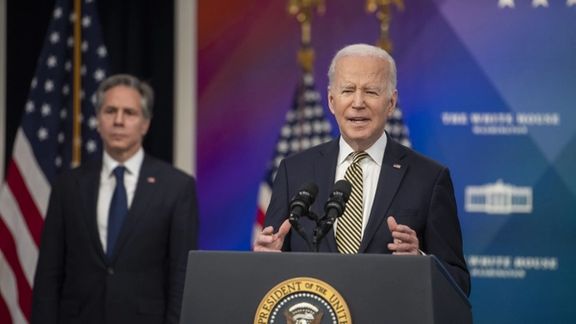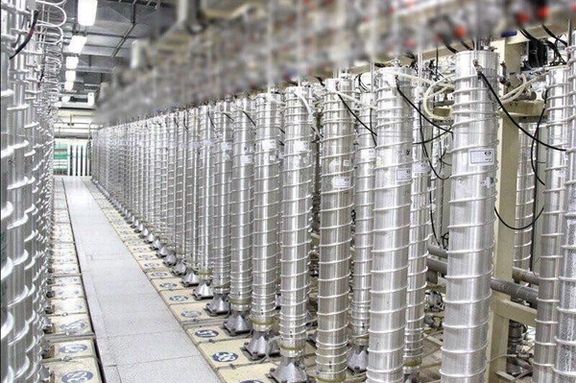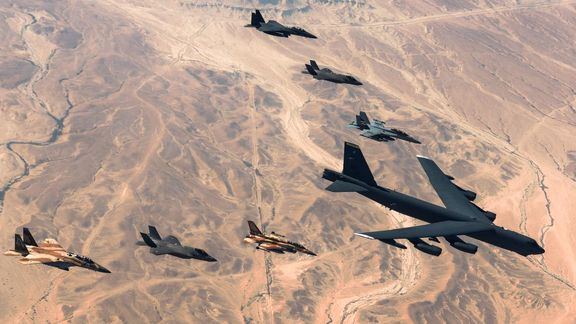Biden Admin Yet To Deny Claims Of Possible Interim Deal With Iran

As reports emerge that Washington is contemplating an interim agreement allowing Iran to enrich uranium to 60%, the Biden Administration is mostly silent.
Reports in Axios claim that a new proposal is being tabled which would offer Iran sanctions relief in exchange for a freeze on certain parts of the nuclear program.
The administration told Axios that it does not want to comment on "rumors" but reports of a plan for an interim deal have quoted several diplomats.
Iran has amassed 87.5 kilograms of 60% enriched uranium, according to an International Atomic Energy Agency report from late February. Experts say that if that uranium is enriched to 90% weapons grade, it would be a sufficient quantity to produce at least one nuclear bomb.
If the Biden team tries to gently return to the 2015 nuclear agreement, taken off the agenda last year over Iran's military assistance to Russia and Tehran's crackdown on anti-government protests, there are other risks ahead.
If sanctions are reduced in exchange for freezing Iran's enrichment at 60 percent, it will essentially recognize Tehran's right to hold on to fissile material that has no civilian use and can be only employed to make nuclear weapons. Under such a deal, Iran can change its mind in the future and quickly ditch the deal and dash towards a bomb in a few months, while having profited from sanctions relief.

The White House has failed to clearly deny the latest news, which suggests to many in Washington, that it is more a reality than a rumor.
An agreement on returning to the 2015 nuclear agreement was nearly reached last September, but Iran pulled out at the last minute after Western countries rejected its demand to shut down the International Atomic Energy Agency (IAEA) investigation into undeclared nuclear sites.
There is huge concern in the global community. Gabriel Noronha, the ex-State Department Iran advisor, said on Twitter: “This October, Iran can buy and sell ballistic missiles and long-range drones to any country (like Russia) *legally* under international law. The UN's asset freeze against 67 Iranian nuclear scientists and entities expires then too.
“In October 2025, all UN sanctions on Iran expire. The European Union pledged to end all its sanctions on Iran then as well. And what's worse, at that point, it will be next to impossible to ever put new ones back in place.”
The Iran threat remains high in Israel, Tehran's archenemy, which has told the US that with or without it, it will deal with the threat it poses. This week, Prime Minister Benjamin Netanyahu told its intelligence agency, Mossad, that Iran remains the threat of the generation.

Israeli officials recently told the Biden administration and European officials that Iran risked a military strike if it enriches uranium above the 60% level, according to Axios.
At a gathering of intelligence staff this week, Netanyahu said: "In every generation there are those who rise up to destroy us and in this generation Iran has risen up to destroy us. If we do not prevent Iran from obtaining nuclear weapons, we will be in a different reality in which the entire world will be hostage to those who have inscribed on their flag their desire to destroy us; therefore, this is our supreme mission.”
Jason Brodsky, policy director at United Against A Nuclear Iran, said the US must find a new approach, the last two years among the administration’s biggest failings. Allowing it to have a 60% threshold will only embolden it further.
Writing for The Atlantic Council, he said: “Tehran has been emboldened to continue to test international red lines by the absence of nuclear deterrence. While the diplomatic door remained open for two years, the regime made its greatest advances. Between May 2018 and January 2021, when the Donald Trump administration was pursuing its maximum pressure policy, Iran only carefully, incrementally, and reversibly advanced its nuclear program beyond the JCPOA limits.”
He, as with others such as Noronho, calls on nations to enact the snapback mechanism, allowing nations to pull back the relief that ending the sanctions on Iran would bring.
“The United States and Europe urgently need a new Iran policy. And the way to begin would be for either Britain or France, as permanent members of the UN Security Council, to invoke the snapback sanctions mechanism under UN Security Council Resolution 2231.
“It would shatter the Iranian decision-making calculus, which begot escalation under the assumption that the United States and Europe would always remain at the negotiating table no matter what steps Tehran takes.”